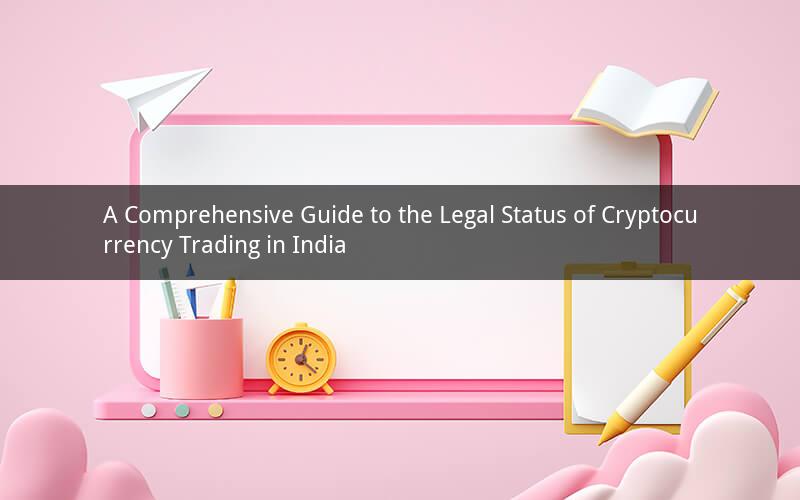
Introduction:
In recent years, the cryptocurrency market has witnessed a significant surge in interest worldwide. India, being a developing country, has also seen a growing number of individuals and businesses venturing into the crypto space. However, the legal status of cryptocurrency trading in India remains a topic of debate and concern. This article aims to provide a detailed overview of the legal landscape surrounding cryptocurrency trading in India, including recent developments and regulatory measures.
1. Understanding Cryptocurrency:
To comprehend the legal implications of cryptocurrency trading in India, it is essential to first understand what cryptocurrency is. Cryptocurrency is a digital or virtual currency that uses cryptography for security. Unlike traditional fiat currencies, cryptocurrencies operate independently of a central authority and are typically based on blockchain technology.
2. Legal Status of Cryptocurrency in India:
The legal status of cryptocurrency in India is somewhat ambiguous. While there is no specific legislation explicitly legalizing or prohibiting cryptocurrency trading, the Reserve Bank of India (RBI) has taken several measures to regulate the crypto market.
2.1 RBI's Position:
In April 2018, the RBI issued a circular prohibiting banks from dealing with or providing services to any entity dealing with or settling in cryptocurrencies. This move was aimed at curbing the risks associated with cryptocurrency trading, such as money laundering and terror financing. However, this circular faced criticism from various quarters, including the Supreme Court.
2.2 Supreme Court Ruling:
In March 2020, the Supreme Court of India struck down the RBI circular, declaring it unconstitutional. The court held that the RBI had overstepped its authority by imposing restrictions on cryptocurrency trading. This ruling paved the way for the resumption of cryptocurrency trading activities in India.
3. Current Legal Landscape:
Following the Supreme Court's ruling, the legal status of cryptocurrency trading in India remains uncertain. While there is no explicit ban on cryptocurrency trading, the absence of clear regulations has created a grey area. Here are some key points to consider:
3.1 Lack of Regulatory Framework:
India lacks a comprehensive regulatory framework for cryptocurrency trading. This absence of regulations has led to concerns regarding consumer protection, market stability, and the potential for misuse.
3.2 Government's Stance:
The Indian government has shown mixed signals regarding the legal status of cryptocurrency. While some officials have expressed concerns about the risks associated with cryptocurrencies, others have advocated for a regulatory approach.
3.3 State Governments' Actions:
Several state governments in India have taken their own initiatives to regulate cryptocurrency trading. For instance, the state of Tamil Nadu has proposed a bill to regulate cryptocurrency trading, while others are considering similar measures.
4. Risks and Challenges:
Despite the ongoing debate, there are several risks and challenges associated with cryptocurrency trading in India:
4.1 Regulatory Uncertainty:
The lack of clear regulations makes it difficult for individuals and businesses to operate in the crypto space without the fear of legal repercussions.
4.2 Security Concerns:
The cryptocurrency market is susceptible to hacking and theft. Investors need to be cautious while dealing with digital assets.
4.3 Market Volatility:
Cryptocurrencies are known for their high volatility, which can lead to significant losses for investors.
5. Future Outlook:
The future of cryptocurrency trading in India remains uncertain. However, several factors could shape the regulatory landscape:
5.1 Government's Decision:
The Indian government's decision on whether to regulate or ban cryptocurrency trading will play a crucial role in shaping the market's future.
5.2 Technological Advancements:
The evolution of blockchain technology and its potential applications in various sectors could influence the government's stance on cryptocurrency.
5.3 Global Trends:
The global regulatory landscape for cryptocurrencies could also impact India's approach to the issue.
Frequently Asked Questions (FAQs):
1. Is it legal to trade cryptocurrencies in India?
Answer: While there is no explicit ban on cryptocurrency trading in India, the legal status remains ambiguous due to the lack of clear regulations.
2. Can I use my bank account for cryptocurrency transactions in India?
Answer: Most banks in India have stopped providing services to cryptocurrency exchanges and traders. However, some banks may still offer services to individuals and businesses dealing with cryptocurrencies.
3. Are there any regulations for cryptocurrency exchanges in India?
Answer: There is no specific regulatory framework for cryptocurrency exchanges in India. However, some state governments are considering bills to regulate the crypto market.
4. What are the risks associated with cryptocurrency trading in India?
Answer: The risks include regulatory uncertainty, security concerns, market volatility, and potential misuse of cryptocurrencies.
5. Can the Indian government ban cryptocurrency trading?
Answer: The Indian government has the authority to ban cryptocurrency trading. However, such a move could face legal challenges and public opposition.